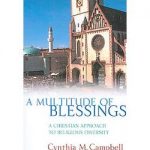Campbell, Cynthia M. A Multitude of Blessings: A Christian Approach to Religious Diversity. Westminster John Knox Press, 2007. ISBN:9780664229566.
Meet the Author
 Cynthia Campbell is the President of McCormick Theological Seminary, where she also serves as Cyrus McCormick Professor of Church and Ministry. An ordained Presbyterian pastor, she served many years in pastoral ministry and was among the first women called as Head of Staff at a large congregation. Campbell is a past President of The Association of Theological Schools. She is author of A Multitude of Blessings: A Christian Approach to Religious Diversity as well as a monograph, Theologies Written from Feminist Perspectives. She has written articles on theology, ministry, ethics, and worship for The Presbyterian Outlook, Reformed World, and Interpretation.
Cynthia Campbell is the President of McCormick Theological Seminary, where she also serves as Cyrus McCormick Professor of Church and Ministry. An ordained Presbyterian pastor, she served many years in pastoral ministry and was among the first women called as Head of Staff at a large congregation. Campbell is a past President of The Association of Theological Schools. She is author of A Multitude of Blessings: A Christian Approach to Religious Diversity as well as a monograph, Theologies Written from Feminist Perspectives. She has written articles on theology, ministry, ethics, and worship for The Presbyterian Outlook, Reformed World, and Interpretation.
Campbell seeks to “show how it is possible to affirm the Christian confession that God has made Godself uniquely known to humankind in the life, death, and resurrection of Jesus and at the same time to affirm that the religious diversity of human history is a part of God’s providential care for humankind” (p. 2). The introductory chapter explores three common Christian approaches to religious diversity (exclusivism, inclusivism, and pluralism) and finds them lacking. Chapters two, three and four consider religious diversity in light of how the bible portrays those outside the biblical faith. Building upon those examples, the final chapter suggests an alternative Christian approach for engaging religious diversity that is faithful to tradition but open to the wideness of God’s mercy extending well beyond a single faith tradition.
So What?
Religion in America is increasingly diverse. Every Christian should give consideration to how to approach the religious other. What view do you hold (exclusivism, inclusivism, pluralism, universalism, Campbell’s alternative view)? Why do you hold that view? How is your view informed by Scripture?
Consider Campbell’s six ways Christians should respond to religious diversity (p.84-85):
- Christians are called to have humility with respect to the question of religious truth.
- We are called to treat others with respect, rather than simply with “tolerance”.
- Christians should give greater attention to the “practices” of Christian faith and how those practices make for a “Christian shape” to life in the world today.
- We must understand what the Christian practice of “bearing witness” to our faith or relationship with Jesus Christ means in a multifaith world.
- Christians are called to “work with others for justice, freedom, and peace,” which has significant implications for building civil community.
- Christians are called to engage others in dialogue with the goal of learning and being open to transformation in the process.
Do you agree or disagree with each of these? Why? If you agree, how do you apply them? If you disagree, what is your alternative framework for response and how do you apply it?
